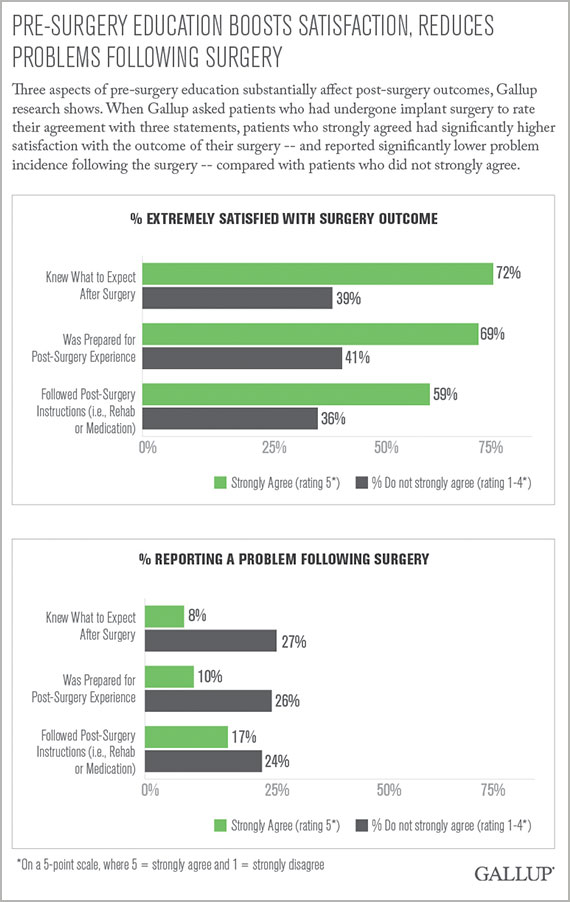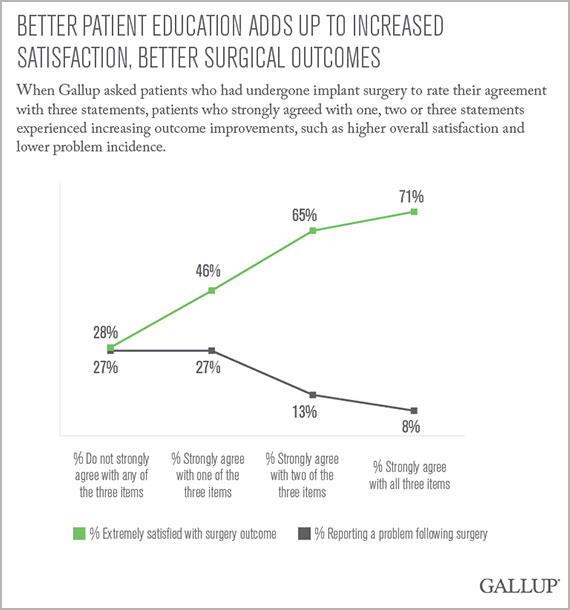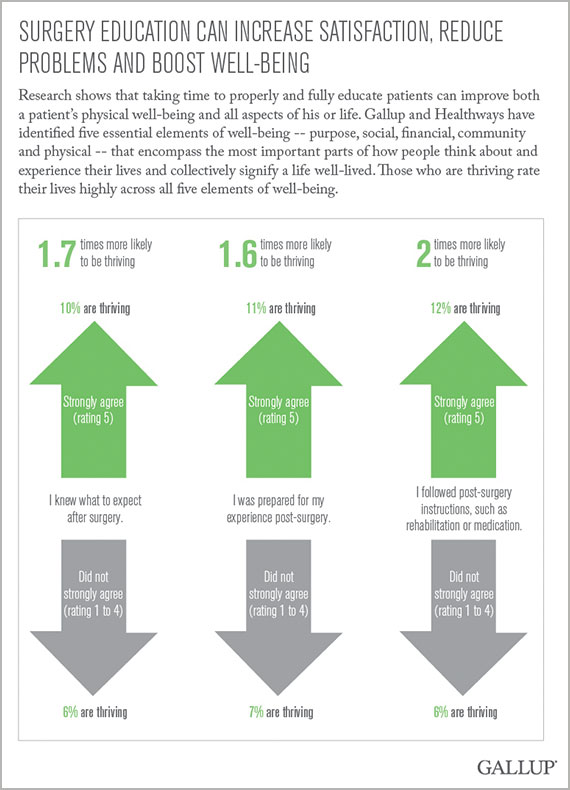Story Highlights
- Three aspects of pre-surgery education affect outcomes
- Quality education can reduce readmissions
- Each aspect of patient education ties to patient well-being
This is the first article in a two-part series.
To customers, feelings are facts. When the customers are hospital patients receiving medical device implants, their emotions are influenced by both the outcomes healthcare providers and medical device companies deliver and by how these outcomes compare with patients' expectations. Patient education is the primary way to manage these expectations.
The education that patients receive before surgery has significant positive effects on surgery outcomes, Gallup's analysis shows. These results include increased overall patient satisfaction, reduced problem incidence and improved quality of life.
The positive relationship between patient education and post-surgery outcomes isn't just good news for patients, it also has significant implications for healthcare providers and medical device manufacturers. For hospitals, reducing the number of problems could directly reduce costly readmissions, while higher patient satisfaction levels could contribute to improved Hospital Consumer Assessment of Healthcare Providers and Systems (HCAHPS) survey scores and a greater share of incentive payments. For physicians and implant manufacturers, lower problem incidence could directly reduce costly revision surgeries, malpractice lawsuits or both.
Even when healthcare leaders place a high priority on patient education, providing this effectively to patients and managing their expectations is hard work. A good place to start is to understand how pre-surgery education affects outcomes.
Pre-Surgery Education Influences Post-Surgery Outcomes
In a recent study, Gallup researchers asked patients undergoing medical device implantation about three important aspects of pre-surgery education. Patients were asked to rate their levels of agreement with the following statements using a scale of 1 (strongly disagree) to 5 (strongly agree):
- I knew what to expect after surgery.
- I was prepared for my experience post-surgery.
- I followed post-surgery instructions, such as rehabilitation or medication.
The analysis showed that each of these aspects of pre-surgery education substantially influenced post-surgery outcomes. Patients who strongly agreed with just one of these statements had significantly higher satisfaction and significantly lower problem incidence compared with patients who did not strongly agree (giving a rating of 1 to 4).
For example, when patients strongly agreed that "I knew what to expect after surgery," 72% were extremely satisfied with the surgery results, and only 8% reported problems following the surgery. When patients did not strongly agree with this item, 39% were extremely satisfied with the surgery results, and 27% reported problems after the surgery.

When patients strongly agreed with two or three of these statements, they experienced even greater outcome improvements, such as higher overall satisfaction and lower problem incidence. When patients strongly agreed with just one of the three patient education items, 46% were extremely satisfied with the results, and 27% reported a problem following surgery. When patients strongly agreed with two items, 65% were extremely satisfied with the results, and 13% reported a problem post-surgery. But when patients strongly agreed with all three items, 71% were extremely satisfied with their results, and just 8% reported a problem following surgery.

Pre-Surgery Education Affects Patients' Post-Surgery Well-Being
The physical and emotional consequences of surgical outcomes go well beyond the scope of the procedure to affecting patients in five key areas of personal well-being. Gallup and Healthways have identified five essential elements of well-being -- purpose, social, financial, community and physical -- that encompass the most important parts of how people think about and experience their lives and collectively signify a life well-lived.
For each aspect of patient education, patients who strongly agreed with a statement were about twice as likely to be thriving in all five well-being elements as patients who did not strongly agree. When patients strongly agreed that "I knew what to expect after surgery," for example, 10% were thriving in all five well-being elements, compared with 6% of patients who did not strongly agree.
These results suggest that poor surgical outcomes -- regardless of their cause -- have consequences for patients, their friends and families, and their community that are more far-reaching than providers may realize. Taking the time properly and fully educate patients can improve both their physical well-being and all aspects of their life.

Taking the time to educate patients before a surgical procedure can have a significant positive effect. Though each of the three key education elements improves outcomes, these elements influence them in different ways. In part two of this series, we'll discuss how healthcare leaders can tailor pre-surgery education to help improve patients' surgical outcomes.
Survey Methods
Results are based on a 2014 medical device Gallup Panel Web and mail study completed by 26,128 national adults, aged 18 and older, conducted Aug. 5-Sept. 16, 2014. Results of the well-being analysis are a combination of four studies: a 2014 medical device study, a 2014 health experience study, a 2014 well-being study and a 2013 well-being study. The Gallup Panel is a probability-based longitudinal panel of U.S. adults who Gallup selects using random-digit-dial phone interviews that cover landline and cellphones. Gallup also uses address-based sampling methods to recruit Panel members. The Gallup Panel is not an opt-in panel and panel members do not receive incentives for participating. In this study, 2,639 respondents reported that they had medical implants in the last 12 months, which is the total sample for the results reported in this article. For results based on this sample, one can say that the maximum margin of sampling error is ±1.9 percentage points, at the 95% confidence level. Margins of error are higher for subsamples. In addition to sampling error, question wording and practical difficulties in conducting surveys can introduce error or bias into the findings of public opinion polls.
